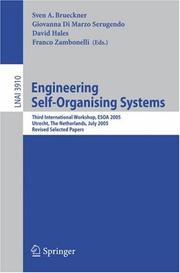| Listing 1 - 3 of 3 |
Sort by
|

ISBN: 9783540333425 3540333428 3540333525 Year: 2006 Publisher: Berlin ; New York : Springer,
Abstract | Keywords | Export | Availability | Bookmark
 Loading...
Loading...Choose an application
- Reference Manager
- EndNote
- RefWorks (Direct export to RefWorks)
The idea that self-organisation and emergence can be harnessed for the purpose of solving tricky engineering problems is becoming increasingly accepted. - searchers working in many diverse ?elds (such as networks, distributed systems, operating systems and agent systems) are beginning to apply this new approach. This book contains recent work from a broad range of areas with the common theme of utilising self-organisation productively. As distributed information infrastructures continue to spread (such as the Internet, wireless and mobile systems), new challenges have arisen demanding robust and scalable solutions. In these new challenging environments the - signers and engineers of global applications and services can seldom rely on centralised control or management, high reliability of devices, or secure en- ronments. At the other end of the scale, ad-hoc sensor networks and ubiquitous computing devices are making it possible to embed millions of smart computing agents into the local environment. Here too systems need to adapt to constant failures and replacement of agents and changes in the environment, without human intervention or centralised management.
Self-organizing systems --- Evolutionary programming (Computer science) --- Evolutionary computation --- Systèmes auto-organisés --- Programmation évolutive --- Réseaux neuronaux à structure évolutive --- Congresses. --- Congrès --- Computer Science --- Mechanical Engineering - General --- Mechanical Engineering --- Engineering & Applied Sciences --- Information Technology --- Artificial Intelligence --- Computer science. --- Computer communication systems. --- Software engineering. --- Operating systems (Computers). --- Information storage and retrieval. --- Artificial intelligence. --- Computers and civilization. --- Computer Science. --- Artificial Intelligence (incl. Robotics). --- Computer Communication Networks. --- Software Engineering. --- Operating Systems. --- Information Storage and Retrieval. --- Computers and Society. --- Civilization and computers --- Civilization --- AI (Artificial intelligence) --- Artificial thinking --- Electronic brains --- Intellectronics --- Intelligence, Artificial --- Intelligent machines --- Machine intelligence --- Thinking, Artificial --- Bionics --- Cognitive science --- Digital computer simulation --- Electronic data processing --- Logic machines --- Machine theory --- Simulation methods --- Fifth generation computers --- Neural computers --- Computer operating systems --- Computers --- Disk operating systems --- Systems software --- Computer software engineering --- Engineering --- Communication systems, Computer --- Computer communication systems --- Data networks, Computer --- ECNs (Electronic communication networks) --- Electronic communication networks --- Networks, Computer --- Teleprocessing networks --- Data transmission systems --- Digital communications --- Electronic systems --- Information networks --- Telecommunication --- Cyberinfrastructure --- Network computers --- Informatics --- Science --- Operating systems --- Distributed processing --- Information storage and retrieva. --- Artificial Intelligence. --- Information storage and retrieval systems. --- Automatic data storage --- Automatic information retrieval --- Automation in documentation --- Computer-based information systems --- Data processing systems --- Data storage and retrieval systems --- Discovery systems, Information --- Information discovery systems --- Information processing systems --- Information retrieval systems --- Machine data storage and retrieval --- Mechanized information storage and retrieval systems --- Computer systems --- Electronic information resources --- Data libraries --- Digital libraries --- Information organization --- Information retrieval
Book
ISBN: 9783540333524 Year: 2006 Publisher: Berlin Heidelberg Springer Berlin Heidelberg
Abstract | Keywords | Export | Availability | Bookmark
 Loading...
Loading...Choose an application
- Reference Manager
- EndNote
- RefWorks (Direct export to RefWorks)
The idea that self-organisation and emergence can be harnessed for the purpose of solving tricky engineering problems is becoming increasingly accepted. - searchers working in many diverse ?elds (such as networks, distributed systems, operating systems and agent systems) are beginning to apply this new approach. This book contains recent work from a broad range of areas with the common theme of utilising self-organisation productively. As distributed information infrastructures continue to spread (such as the Internet, wireless and mobile systems), new challenges have arisen demanding robust and scalable solutions. In these new challenging environments the - signers and engineers of global applications and services can seldom rely on centralised control or management, high reliability of devices, or secure en- ronments. At the other end of the scale, ad-hoc sensor networks and ubiquitous computing devices are making it possible to embed millions of smart computing agents into the local environment. Here too systems need to adapt to constant failures and replacement of agents and changes in the environment, without human intervention or centralised management.
Computer architecture. Operating systems --- Information systems --- Artificial intelligence. Robotics. Simulation. Graphics --- Computer. Automation --- IR (information retrieval) --- informatica --- maatschappij --- software engineering --- KI (kunstmatige intelligentie) --- OS (operating system) --- computernetwerken --- robots
Digital
ISBN: 9783540333524 Year: 2006 Publisher: Berlin Heidelberg Springer
Abstract | Keywords | Export | Availability | Bookmark
 Loading...
Loading...Choose an application
- Reference Manager
- EndNote
- RefWorks (Direct export to RefWorks)
Computer architecture. Operating systems --- Information systems --- Artificial intelligence. Robotics. Simulation. Graphics --- Computer. Automation --- IR (information retrieval) --- informatica --- maatschappij --- software engineering --- KI (kunstmatige intelligentie) --- OS (operating system) --- computernetwerken --- robots --- AI (artificiële intelligentie)
| Listing 1 - 3 of 3 |
Sort by
|

 Search
Search Feedback
Feedback About UniCat
About UniCat  Help
Help News
News